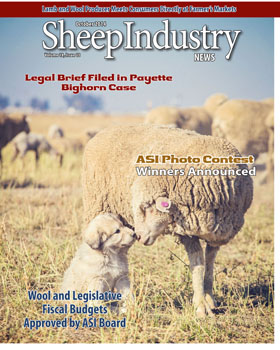
- October 2014
- President’s Notes
- ASI Team Represents Industry in Nanjing
- Belt Buckle Commemorates ASI’s 150th Anniversary
- Colorado Youngster Constructs Lego Camp in Honor of Family Heritage
- Commentary: Recent Headlines Are Example of Public’s Misunderstanding of Protection Dogs
- Dan Wilson: The Best Lamb Marketer is Usually the Person Who Raised the Lamb
- Grazing Allotments, Bighorns Take the Stage at Public Lands Council Meeting
- Market Report
- Nomination Deadline for Annual ASI Awards: Nov. 15
- Opening Brief Focused on Forest Service Payette Errors
- Sheep Budgets for 2014 Approved by Board
- Sheep News in Brief
- Working Together to Make Sheep Better
Sheep Budgets for 2014 Approved by Board
The ASI Board of Directors unanimously approved the association’s fiscal year 2014-2015 wool budget and the legislative budget, as well as a supplemental budget dedicated to the Grow our Flock and sheep research priorities. The budget proposals were recommended to the directors by ASI’s American Wool Council (AWC) and the executive board.
The wool budget provides programs and services that will improve sheep production, marketing and information about American wool. The wool programs serve sheep producers, domestic and international wool initiatives and the use of American wool by the U.S. military.
Funds are also provided for local wool projects through the Wool Outreach program.
This year, a supplemental wool budget was included to fund ASI Board of Director’s unanimous motions to support the Industry Roadmap through Grow our Flock and research.
Promotional and direct-marketing activities with the international wool industry have been approved by the U.S. Department of Agriculture’s Foreign Agricultural Service to be carried out by ASI in the upcoming fiscal year.
Activities that have been a major force in creating international markets for the United States over the last dozen years will continue.
The quality improvement program will continue to focus on providing the most valuable U.S. wool products to new and returning international customers, as well as domestic buyers. This includes concentrating on programs emphasizing the production of quality wools through genetic improvement.
The board approved the rate of State Association membership dues to be the same as it was in past years.
In addition, the due increase for an ASI individual membership to $50 minimum was approved.
“I am very pleased with the board of director’s support for ASI’s innovative programs for the next fiscal year,” said ASI President Clint Krebs. “These approved programs are vital to keeping our industry thriving and gaining strength into the future, and it is encouraging that the state organizations recognize that value.”

